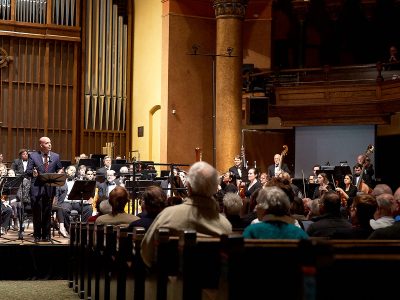By Dan Rubinstein
Photos by Chris Roussakis and Justin Tang
Carleton Physics Prof. Manuella Vincter has played a leading role in the university’s important contributions to the ATLAS project, the largest particle detector ever built and one of four major experiments at the Large Hadron Collider (LHC) particle accelerator, a 27-kilometre ring of superconducting magnets buried beneath the French-Swiss border near Geneva.
After logging hundreds of hours onsite in the ATLAS control room, Vincter’s involvement in the enormous international collaboration — where discoveries have already led to a Nobel Prize in Physics — is set to expand.
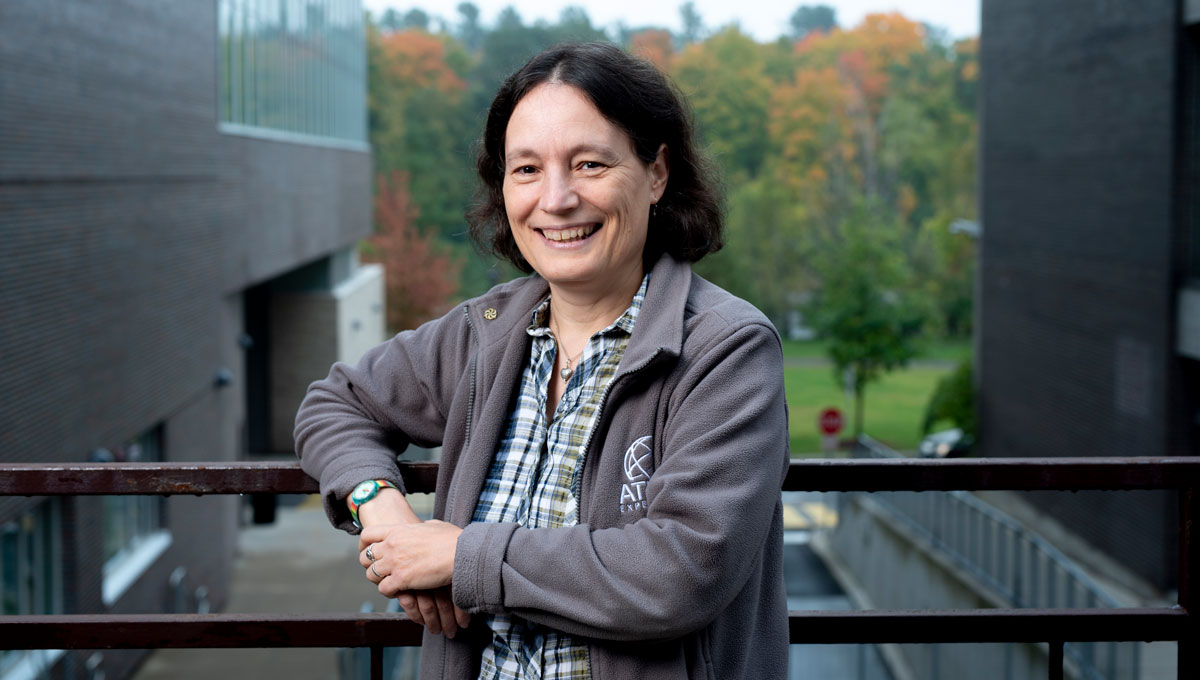
On March 1, 2019, the Canada Research Professor in Particle Physics will begin a two-year term as Deputy Spokesperson at ATLAS, which is one of the most significant scientific projects in the world and, according to the experiment’s website, “uses precision measurement to push the frontiers of knowledge by seeking answers to fundamental questions such as: What are the basic building blocks of matter? What are the fundamental forces of nature? Could there be a greater underlying symmetry to our universe?”
Vincter will be one of two deputies who will work with Spokesperson Karl Jakobs from the University of Freiburg in Germany to globally oversee all aspects of the ATLAS project, including operations of the detector and its scientific output. They will also represent ATLAS to the outside world and share responsibilities related to the productivity and integrity of the scientific results.
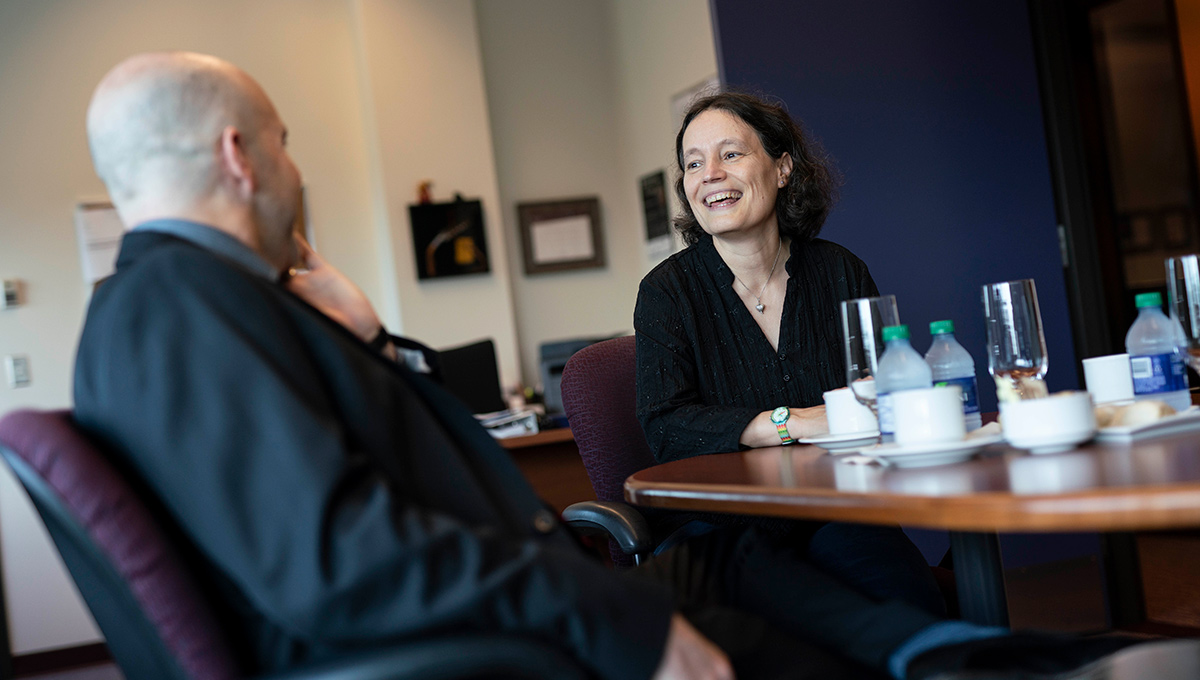
Showcasing the Rising Prominence of Female Researchers in STEM Fields
Announced in Switzerland on Oct. 12, Vincter’s prestigious duties not only reflect the efforts of the entire Carleton ATLAS team, currently leading a pair of upgrades to the experiment, but also showcase the rising prominence of female researchers in physics and other STEM (science, technology, engineering and math) fields.
“Manuella’s new role at CERN is a tribute to her exceptional qualities as a researcher and as a leader,” says Carleton President Benoit-Antoine Bacon.
“She is a prime example of Carleton’s contributions to globally significant science programs. She is also a fantastic role model for our students and for all women working or considering work in STEM research and education.”
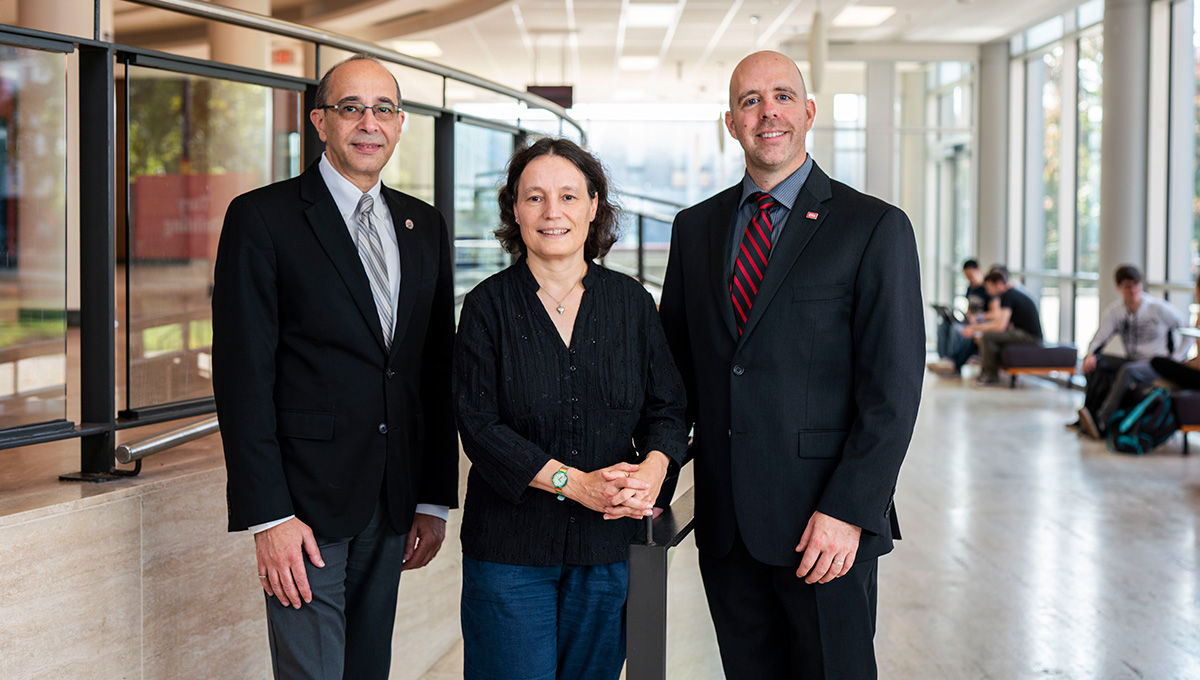
Prof. Manuella Vincter meets with President Benoit-Antoine Bacon and Rafik Goubran, vice-president (Research and International).
“Physics is one of our main research strength areas,” says Carleton vice-president (Research and International) Rafik Goubran. “Our physics researchers are making pioneering contributions to the ATLAS experiment, to the TRIUMF particle accelerator centre, and to SNOLAB in Sudbury.”
Vincter’s responsibilities as Deputy Spokesperson will include working with the respective ATLAS communities to ensure proper operation of the ATLAS detector and the quality of the data for use in physics analyses, working with the ATLAS speakers’ committee to select speakers at international conferences, and interactions with the team leaders of the ATLAS institutes for the proper implementation of the task-sharing responsibilities required for the maintenance, operation and upgrades of the detector.
“The Spokesperson and both deputies also share the responsibilities related to the productivity and integrity of the scientific results,” says Vincter, who will be based at CERN (the European Organization for Nuclear Research), which operates the LHC and ATLAS, but remain a faculty member at Carleton during this two-year period. “I will hold a critical responsibility in the success of the scientific program of ATLAS.”

Carleton a Major ATLAS Contributor
ATLAS uses high-energy proton collisions from the LHC, which is considered the largest particle physics laboratory in the world, to reproduce the conditions of the early universe less than a billionth of a second after the big bang.
The ATLAS collaboration brings together approximately 5,500 scientists, including nearly 2,500 PhD-holding physicists and 1,700 graduate students from 231 institutes and 38 countries.
In July 2012, the ATLAS collaboration announced the observation of a new particle consistent with the long-sought Higgs boson. This ground-breaking discovery is one of the most significant experimental achievements in fundamental physics.
The 2013 Nobel Prize in Physics was a direct consequence of the Higgs boson paper produced as a result of the ATLAS discovery. Since the start of data-taking in 2010, ATLAS has submitted or published approximately 800 peer-reviewed scientific journal articles.
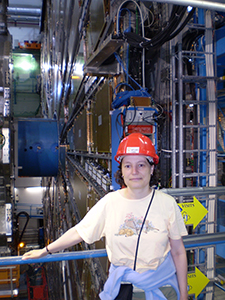
Prof. Manuella Vincter at CERN.
The Canadian involvement in ATLAS and the LHC started in 1992. Carleton’s ATLAS team was a major contributor to the forward calorimeter detector, built at Carleton and successfully operating in ATLAS since the start of collisions in 2009.
This team now is actively involved, supported by two major awards from the Canada Foundation for Innovation, in constructing new sub-detector components for future upgrades of the ATLAS detector. Carleton is the lead institute in Canada in the New Small Wheel muon-system project and is a leading contributor to the new Inner Tracker project.
The Carleton team consists of six faculty members (Alain Bellerive, Dag Gillberg, Jesse Heilman, Gerald Oakham, Thomas Koffas and Vincter), three postdoctoral fellows and seven graduate students.
“The LHC will enter a two-year shutdown of operations starting in January 2019 for maintenance and upgrade of critical detector components, including some where Carleton holds responsibilities,” says Vincter, who was a Canada Research Chair in Particle Physics from 2004 to 2009 and received a Research Achievement Award at Carleton in 2015.
“Given the scope of the ATLAS experiment and its very close proximity to the main campus of CERN, the ATLAS experimental cavern will see many visits from world leaders, international scientific leadership representatives, as well as the media and even the entertainment world. I will share the duty to act as host to such visits of ATLAS.”
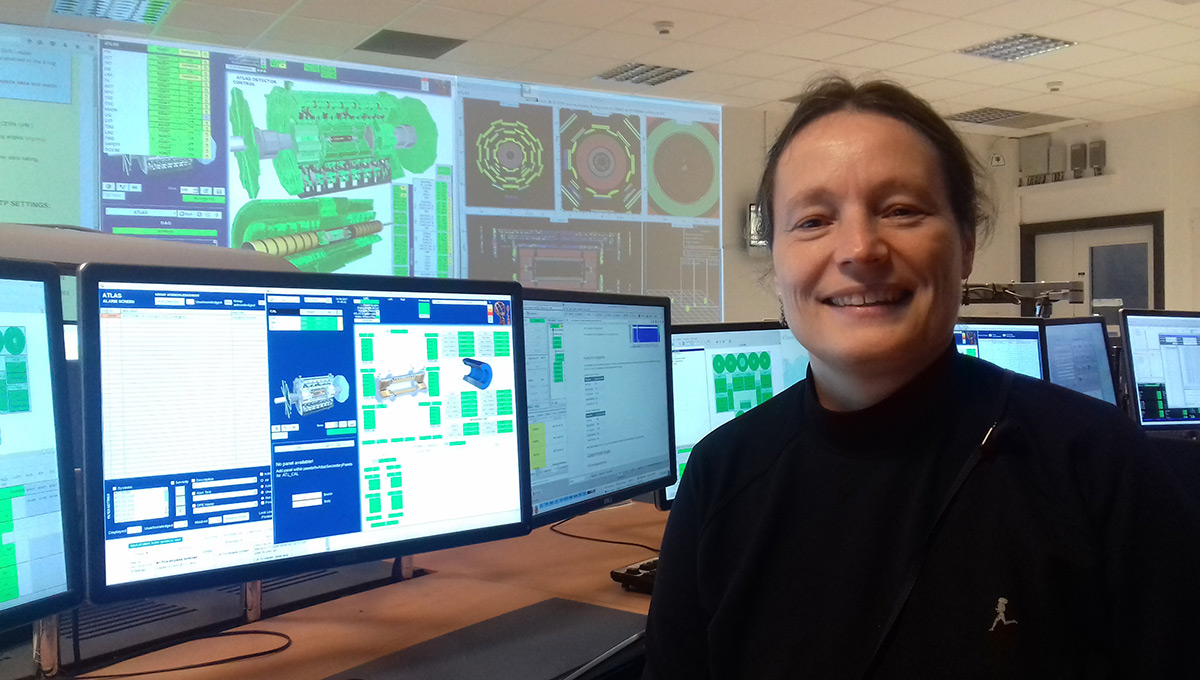
Guarding Against Sudden Shutdowns
From 2014 to 2017, Vincter spent three years on rotating shifts in the ATLAS control room, monitoring the data flow when the collider was running and troubleshooting when things went wrong.
Vincter was at CERN for two of those years on a Killam Research Fellowship and remained on site near Geneva during her sabbatical.
In May 2017, after its annual winter shutdown, the LHC began smashing together protons again, and Vincter worked a string of eight-hour overnight shifts — a “super exciting,” albeit tiring, assignment for somebody who’s not a night owl.
“That’s eight hours of paying attention non-stop,” says Vincter.
“The most important thing is to make sure that it is operating safely. It runs at a very high voltage and there are a number of gas systems, so we have a complicated software program that tells us if things are working properly.”
If a thunderstorm trips the power grid — or if a weasel chews through an external electrical cable, which has happened — the LHC will shut down. Mundane issues, like plumbing problems, can do the same thing. As with any home computer, a sudden shutdown can be far from graceful, says Vincter, “so you need to babysit the LHC as it comes back up again.”
When the LHC is functioning smoothly, protons travelling just below the speed of light collide every 25 nanoseconds, converting energy to mass by producing new particles, and recreating, as Vincter explains, “the conditions of the early universe, less than a billionth of a second after the Big Bang.”
Most of these particles are well known, and the data from these collisions can be discarded. But when rare events occur — when collisions create “exotic” particles that are fundamental to our understanding of how matter interacts with natural forces — the results must be recorded on the spot.
“We only have one shot at taking that data and have to make very fast decisions as to whether it might potentially be interesting,” says Vincter. “We can’t store everything. It’s just too much information.
“In the control room,” she continues, “we also monitor the integrity of the data. Are they clean? Are they being recorded properly? Is the detector responding correctly to the prompts it’s getting? It would be really unfortunate if you took a lot of data and then realized they are corrupted and you couldn’t actually interpret them.”
Although LHC data are shared widely, researchers at CERN have time to process the results and look for interesting physics (at least when they’re not working overnight shifts). When they see something unexpected, a phenomenon that could lead to a greater understanding of our world, their eyes light up — and all those sleepless nights are worth it.
Friday, October 12, 2018 in Faculty of Science, Physics, Research
Share: Twitter, Facebook

